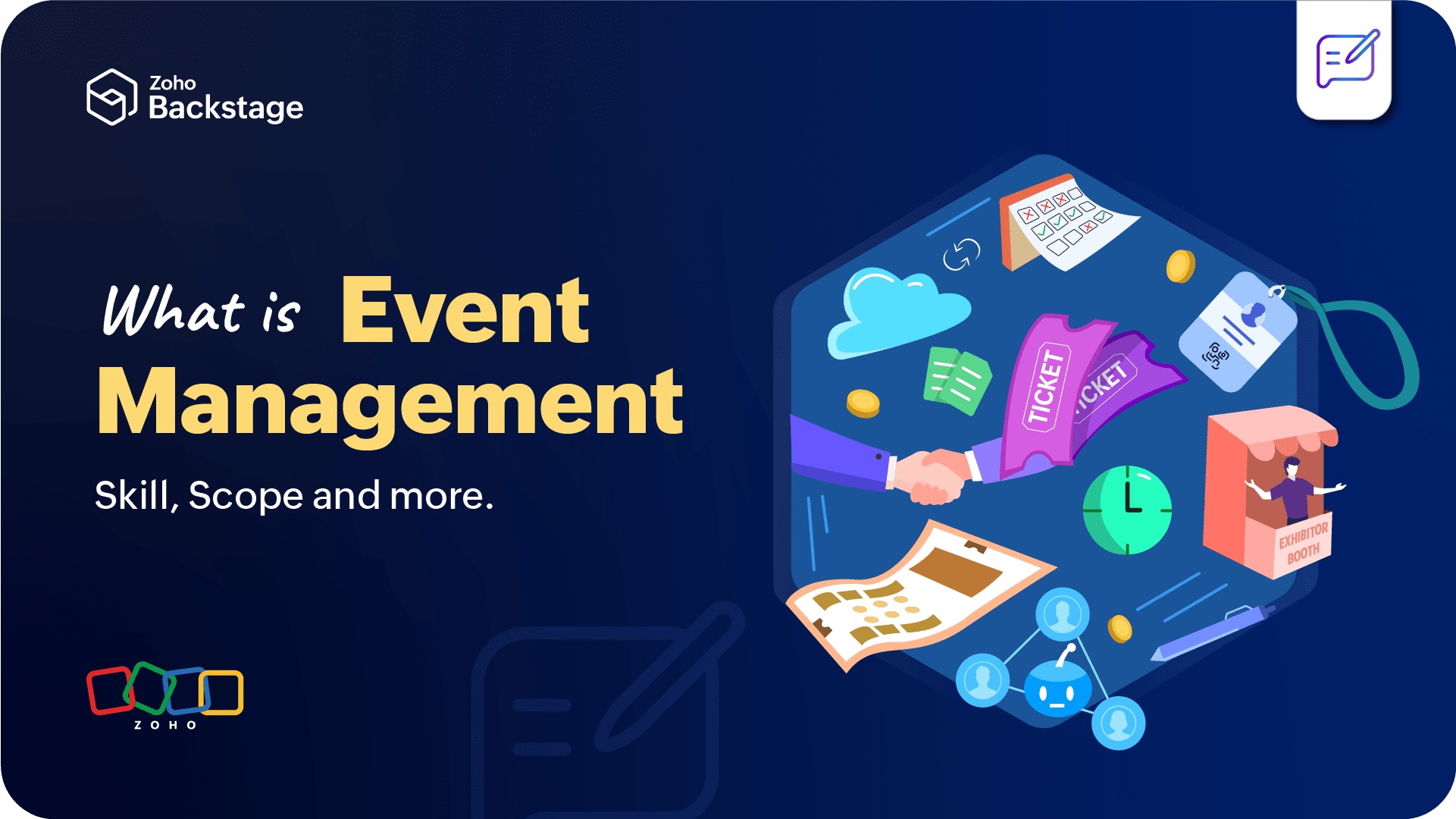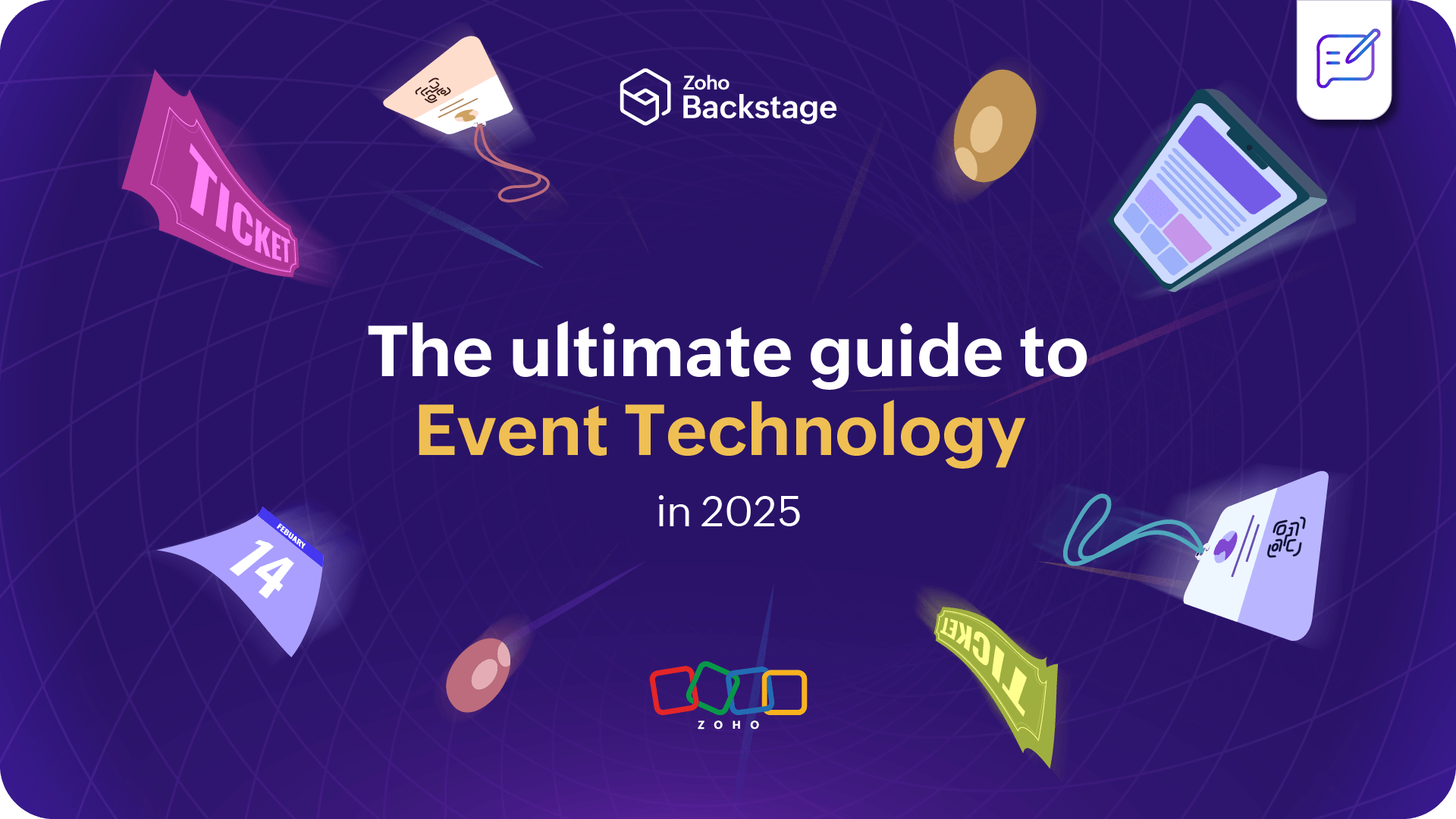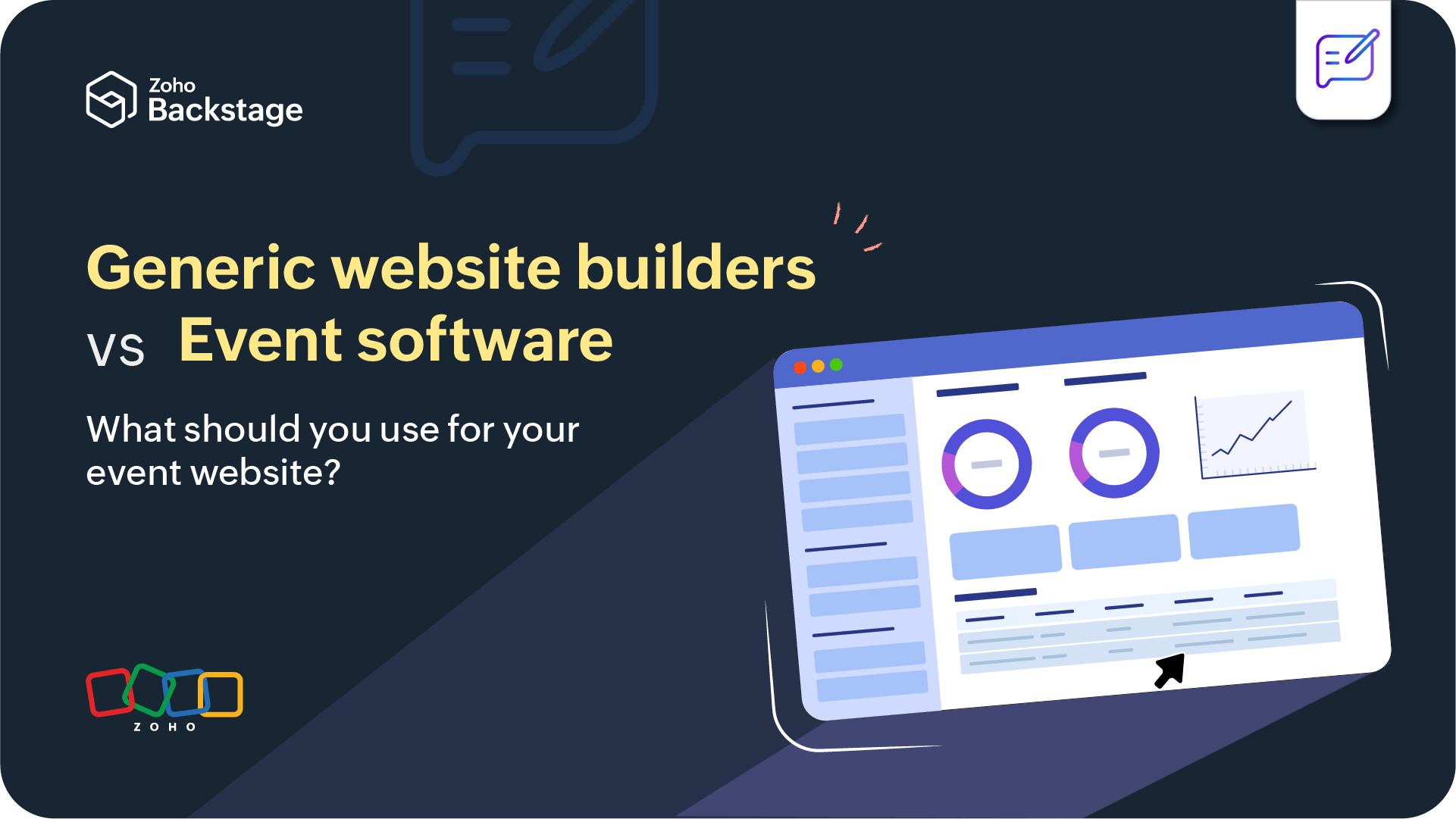- HOME
- Technology
- What is event management? Skills, scope, and more
What is event management? Skills, scope, and more
- Last Updated : May 22, 2025
- 3.0K Views
- 5 Min Read

Have you ever experienced an event that unfolded flawlessly— Where every detail, from the captivating atmosphere to the engaging speakers and seamless transitions, seemed orchestrated by an unseen magic?
But the truth is, perfection in the event world is never an accident; it's meticulously brought to life by the invisible hand of an event planner.
So, what does an event manager do?
Conceptualize and plan: Brainstorm innovative ideas, set clear goals, and meticulously plan every detail within budgets and timeframes.
Master the logistics: Source the perfect venue, negotiate with vendors, integrate technology seamlessly, and ensure safety and security throughout.
Spread the word: Craft compelling marketing strategies, generate excitement, and attract the right audience.
Execute with precision: Oversee the day-to-day tasks, ensure smooth operations, and adapt to unexpected situations with grace.
Measure and improve: Gather valuable feedback, analyze results, and constantly seek ways to elevate future events.
Event management vs. event planning
While the event industry throws around many titles, from administrative assistants to event technologists, one thing unites them all: bringing events to life.
The core skillset remains the same: creativity, organization, strong communication, and the ability to juggle multiple tasks while keeping a cool head under pressure.
Skills needed to be an event planner
Event management, far from being just logistics and checklists, is the art of bringing people together. But don't be fooled by the seemingly glamorous facade. Event planners are the chameleons of the industry, wearing many hats.
Creatives: They translate abstract ideas into clear and concise messages, ensuring everyone—clients, vendors, stakeholders—understands their vision and expectations.
Design captivating environments: Lighting, music, scents, and even furniture arrangements become tools to transport attendees to another world. They understand how sensory elements evoke emotions and shape the overall experience.
Curate experiences that engage and inspire. From interactive workshops to surprise performances, they weave unexpected moments that leave a lasting impression. They're not just event planners; they're experience architects.
Tech-adept: Gone are the days of paper trails and manual processes. Event planners leverage technology to do many things.
Streamline processes: Online registration, vendor communication, and task automation are some of the features of event management software that saves time and effort. Learn more here
Enhance communication: Event mobile apps keep attendees informed, facilitate feedback, and foster engagement throughout the event.
Deliver innovative experiences: Virtual reality experiences, gamification elements, and interactive tools add a layer of excitement and immersion. They're not afraid to embrace the latest tech trends.
Peoples persons: From caterers to florists to tech teams, they juggle a diverse cast of characters. Event planners understand the importance of the follow elements.
Building relationships: They build trust and rapport with everyone involved. They're excellent communicators and active listeners.
Making everyone feel valued: They go the extra mile to ensure everyone feels welcome, included, and appreciated. Their attention to detail extends beyond logistics to creating a positive and inclusive atmosphere.
Networking: Working a room is their forte. They create opportunities for meaningful interactions between attendees, sponsors, and speakers, fostering lasting connections and collaborations.
Logistics experts: From to-do lists to detailed project management software, they orchestrate every element, ensuring nothing falls through the cracks. They juggle budgets, negotiate contracts, manage vendors, and ensure every detail, from catering to transportation, runs like clockwork.
Problem-solvers: When the unexpected happens, they remain calm, assess the situation quickly, and adjust their approach with lightning speed. They think outside the box, find creative solutions with limited resources, and turn challenges into opportunities. They possess an uncanny ability to make things work, even when faced with adversity. The show must go on, no matter what.
Diving deeper: Key aspects of event management
Now that we've explored the different roles event planners play, let's take a look at the typical event planning process. This will give us a clearer picture of how these skills come together to create a successful event.
Venue selection: Finding the perfect space that aligns with the event's size, theme, and budget.
Logistics management: Overseeing catering, transportation, and equipment rentals.
Speaker management: Coordinating with speakers, panelists, and performers.
Marketing and promotion: Generating excitement and driving registrations.
On-site execution: Ensuring everything runs smoothly on the event day.
Post-event evaluation: Measuring success and gathering feedback for improvement.
Exploring different event types
Event management isn't a one-size-fits-all game. The specific tasks and approaches vary depending on the event type. Here's a glimpse into the diverse world of events.
Conferences
Conferences bring together professionals for knowledge sharing, networking, and industry engagement. Think lectures, workshops, and panel discussions. Key considerations include the following.
Curating engaging content: Identifying relevant speakers, tailoring sessions to target audiences, and incorporating interactive elements are crucial.
Logistics with a purpose: Managing registrations, travel arrangements, venue layout, and technology integration all play vital roles.
Networking beyond chance encounters: Dedicated spaces, facilitated activities, and online platforms can enhance attendee interaction.
Trade shows
Trade shows provide brands with a platform to showcase products, connect with potential customers, and generate leads. Event planners in this realm become architects of immersive experiences, balancing brand messaging with attendee engagement. Key considerations include the following points.
Designing captivating booths: Visually arresting displays, interactive demonstrations, and engaging promotional activities draw attention.
Lead generation strategies: Implementing efficient lead capture systems, pre-event marketing campaigns, and follow-up strategies are essential.
Cultivating brand awareness: Creating a cohesive brand message across all touchpoints, from booth design to promotional materials, is key.
Weddings and special events
Weddings and special events demand meticulous attention to detail, personal touch, and creating moments that resonate with the client's vision. Event planners here become storytellers, translating emotions into unforgettable experiences. Key considerations include the following elements.
Understanding the narrative: Capturing the client's vision, personality, and desired atmosphere is paramount for a personalized experience.
Vendor synergy: Selecting and coordinating caterers, decorators, entertainment, and other vendors to ensure seamless execution.
Orchestrating the flow: Creating a well-timed agenda, managing logistics on the day, and anticipating potential hiccups are crucial.
Festivals
Music festivals, food festivals, and cultural celebrations present unique challenges with large crowds, diverse needs, and a focus on creating an electrifying atmosphere. Event planners become maestros of logistics and crowd management, ensuring safety and enjoyment for all. Key considerations include the following.
Safety first: Ensuring proper infrastructure, emergency plans, and crowd control measures are paramount.
Stage magic: Coordinating artists, managing performance timings, and ensuring seamless technical execution are essential.
Creating a vibrant ambiance: Curating diverse vendors, food options, and entertainment creates a memorable experience.
Ready to be a part of this dynamic world? Event management offers a rewarding career path, filled with creativity, challenge, and the satisfaction of seeing your vision come to life. So, whether you're an aspiring professional or simply curious about the magic behind unforgettable experiences, explore further, ask questions, and who knows, you might just be the next expert pulling off extraordinary events!
Do you have any memorable event planning experiences you'd like to share? What aspects of event management pique your curiosity? Share your thoughts in the comments below!
Resources for event planners
Marketing emails checklist + templates
Guide to planning an exhibition + free checklist
 Lavanya
LavanyaMarketer by day, geek extraordinaire by night—You can often find me at gig nights or the philosophy sections of bookstores. In my free time, I usually got headphones on, lost in an audiobook or podcast while indulging in my latest hobby, aka hyperfixation du jour. I like to travel to make feline friends everywhere I go. Sometimes I write. Join me as I navigate through the event industry!






